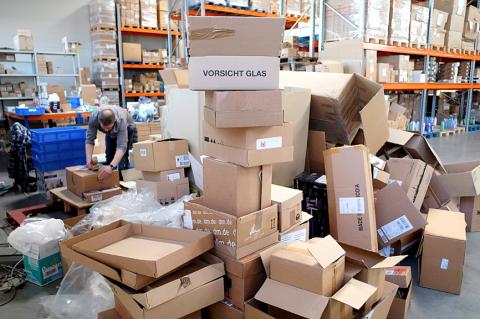In a warehouse in the western German city of Cologne, bottles of deodorant and shower gel plastered with the face of football manager Joachim Loew are stacked all the way up to the ceiling.
Whole pallets of the packages, a promotional offer for the Euro 2016 tournament, were headed for the incinerators once the final whistle sounded, but nonprofit group Innatura has saved them for charities.
Further east in Berlin, residents are leaving extra salad, yogurt or bread in common fridges sitting in inner courtyards for neighbors to help themselves, in another effort to cut down on wastage.

Photo: AFP
Despite its well-established recycling movement, Europe’s most populous nation still generates enormous amounts of unnecessary waste, from usable consumer products to still-edible food, and people are starting to think up new ways to change that.
Juliane Kronen of Innatura set up the cooperative four years ago, urging businesses to donate items that have to be removed from retailers’ shelves for some reason or other.
The group then redistributes the bounty to charities around Germany for a small consideration of between 5 and 20 percent of the list price.

Photo: AFP
Such forms of giving are a relative novelty in Germany, where heavy regulation can make giving away excess stock an expensive chore.
“It’s less expensive in Germany for a company to burn products than to give them away” due to a tax on donations, said Kronen, a lively 50-something entrepreneur sporting salt-and-pepper hair. “Every year in Germany we burn or destroy 7 billion euros’ [US$7.43 billion] worth of products.”
Kronen points out “completely new” packages of nappies, tubes of sun cream, dish soap, kitchen mixers and trainers stuffing the Innatura warehouse — about 1,500 different items in all.
Bizarre relics of an economy powered by exports and consumer spending are everywhere in this Aladdin’s cave.
In one corner lie boxes of deodorant sprays whose labels make them unsuitable for export since the EU imposed sanctions on Russia over the Ukraine conflict.
Further on are double-extra-large packages of dishwasher tablets from a forgotten limited-time-only offer — pulled from the shelves once the promotion was over.
Innatura has saved about 580 tonnes of products from the furnaces since Kronen founded the company four years ago, she said.
While organizations like Innatura are battling the tidal wave of perfectly usable items being thrown away and burned, others are working from the ground up to make the most of food that would otherwise be dumped.
Germans throw away more than 18 million tonnes of food every year, or 313kg every single second, according to WWF.
About 600km from Cologne, Berliner Fenja is making a small dent in that total as she opens the door of a clapped-out fridge in the courtyard of an apartment block in the northeastern Prenzlauer Berg District.
Once she has dropped off her chard vegetables and rocket leaf, Fenja posts the donation on the Foodsharing Internet platform to let other users know about it — as does neighbor Silvia, who has contributed a kilogram of onions and some rosemary.
Anyone can help themselves to the ingredients at this spot or one of the other 300 fridges and drop-off points that have sprung up around big German cities.
“We’ve managed to save more than 8,000 tonnes of food” over the five years the platform has been active, Foodsharing e.V. cofounder Frank Bowinkelmann said.
Any food is welcome, from yogurts that might otherwise get thrown away before holidaymakers set off, to leftover rolls after a hard day’s work at the bakery.
However, “consumers aren’t the only ones responsible” for addressing the shocking levels of waste in Western societies, Bowinkelmann said.
Manufacturers and retailers sell flour by the kilogram or potatoes by the sack to customers who likely only need a fraction of what they are buying.
“How many of those end up in the rubbish? Manufacturers have to evolve as well,” he said.
Foodsharing has “touched a sore spot” in society with its mission, Bowinkelmann added. “People are more and more conscious of the massive waste.”

The US dollar was trading at NT$29.7 at 10am today on the Taipei Foreign Exchange, as the New Taiwan dollar gained NT$1.364 from the previous close last week. The NT dollar continued to rise today, after surging 3.07 percent on Friday. After opening at NT$30.91, the NT dollar gained more than NT$1 in just 15 minutes, briefly passing the NT$30 mark. Before the US Department of the Treasury's semi-annual currency report came out, expectations that the NT dollar would keep rising were already building. The NT dollar on Friday closed at NT$31.064, up by NT$0.953 — a 3.07 percent single-day gain. Today,

‘SHORT TERM’: The local currency would likely remain strong in the near term, driven by anticipated US trade pressure, capital inflows and expectations of a US Fed rate cut The US dollar is expected to fall below NT$30 in the near term, as traders anticipate increased pressure from Washington for Taiwan to allow the New Taiwan dollar to appreciate, Cathay United Bank (國泰世華銀行) chief economist Lin Chi-chao (林啟超) said. Following a sharp drop in the greenback against the NT dollar on Friday, Lin told the Central News Agency that the local currency is likely to remain strong in the short term, driven in part by market psychology surrounding anticipated US policy pressure. On Friday, the US dollar fell NT$0.953, or 3.07 percent, closing at NT$31.064 — its lowest level since Jan.

Hong Kong authorities ramped up sales of the local dollar as the greenback’s slide threatened the foreign-exchange peg. The Hong Kong Monetary Authority (HKMA) sold a record HK$60.5 billion (US$7.8 billion) of the city’s currency, according to an alert sent on its Bloomberg page yesterday in Asia, after it tested the upper end of its trading band. That added to the HK$56.1 billion of sales versus the greenback since Friday. The rapid intervention signals efforts from the city’s authorities to limit the local currency’s moves within its HK$7.75 to HK$7.85 per US dollar trading band. Heavy sales of the local dollar by

The Financial Supervisory Commission (FSC) yesterday met with some of the nation’s largest insurance companies as a skyrocketing New Taiwan dollar piles pressure on their hundreds of billions of dollars in US bond investments. The commission has asked some life insurance firms, among the biggest Asian holders of US debt, to discuss how the rapidly strengthening NT dollar has impacted their operations, people familiar with the matter said. The meeting took place as the NT dollar jumped as much as 5 percent yesterday, its biggest intraday gain in more than three decades. The local currency surged as exporters rushed to